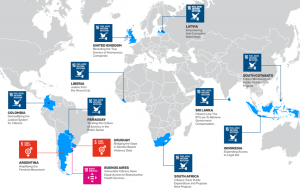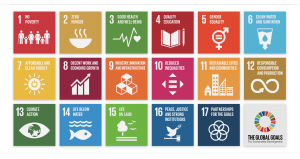Tackling the Slow Progress of SDGs Implementation
Acelerando el avance en la implementación de los ODS
The 2030 Agenda for Sustainable Development sets ambitious goals and reaching them constitutes a considerable challenge globally. The High-Level Political Forum (HLPF) held in July this year demonstrated that the progress towards achieving the Sustainable Development Goals (SDGs) is slow. The same is true for Georgia. The Sustainable Development Report 2019 emphasizes that more in-depth, fast, and robust steps are needed in order to achieve the social-economic transformation of states and enable the realization of the SDGs.
The SDGs cannot be reached by public institutions alone working in silos. It is necessary to include all relevant stakeholders in the process and share responsibilities.
Cooperation between civil society and government is the cornerstone of the Open Government Partnership (OGP). OGP members take the responsibility to be more open to citizen participation and include them in the decision-making process. OGP can be a vital partner to achieve the SDGs.
The above mentioned was also officially stated in the Joint Declaration on Open Government for the Implementation of the 2030 Agenda for Sustainable Development, adopted by the members of the OGP Steering Committee in New York, September 2015. Moreover, in February this year the UN Development Programme (UNDP) and the OGP made a joint commitment to advancing the 2030 Agenda for Sustainable Development through open government initiatives and signed a Memorandum of Understanding (MoU). Based on the MoU both organizations will collaborate to leverage OGP action plans as a mechanism to advocate for domestic reforms that enhance efforts to achieve the SDGs.
The case of Georgia is a good example of how OGP supports the implementation of the SDGs. Georgia’s latest OGP action plan includes a commitment to develop an effective system of public monitoring of the SDGs implementation process. Namely, according to the commitment of the Government Administration of Georgia, a new website (SDG Tracker) will be developed and implemented in order to enable effective and transparent monitoring of the SDGs.
The purpose of the SDG Tracker is to centralize comprehensive information on the SDGs nationalization and localization processes. Using the front-end of the website, users will be able to receive information online on the progress achieved within each goal and the activities carried out by the public agencies for meeting the SDGs, while the back-end of the system will be designed for internal management of the SDGs nationalization and localization process.
Based on the cooperation between the government entities and the Institute for Development of Freedom of Information (IDFI), the SDG Tracker was created with the support of UNDP and the Swedish International Development Agency (SIDA). The website will be fully functional by the end of the year.
Today, when the progress of SDGs implementation is slow on a global scale, it is crucial to fully realize the importance of already existing platforms such as OGP. Countries should take more initiatives to reflect specific challenges linked with SDGs in their OGP action plans. At the same time, national authorities should internalize the role of civil society organizations in the implementation process of the SDGs and ensure close cooperation with them based on multi-sectoral initiatives.
La Agenda 2030 para el Desarrollo Sostenible planteó objetivos muy ambiciosos y su cumplimiento representa un reto importante a nivel global. En el Foro Político de Alto Nivel (FPAN) que se llevó a cabo en julio de este año se demostró que los avances hacia el cumplimiento de los Objetivos de Desarrollo Sostenible (ODS) han sido muy lentos. Lo mismo ocurre en Georgia. El Informe de Desarrollo Sostenible 2019 recalca que es necesario implementar acciones más profundas, rápidas y robustas para lograr la transformación socioeconómica de los estados y contribuir al logro de los ODS.
Mientras las instituciones trabajen de forma aislada, no podremos lograr el cumplimiento de los ODS. Es necesario incluir en el proceso a todos los actores responsables y compartir responsabilidades.
La cooperación entre la sociedad civil y el gobierno es el punto central de la Alianza para el Gobierno Abierto (OGP por sus siglas en inglés). Los miembros de OGP han adoptado la responsabilidad de ser más abiertos a sus ciudadanos e incluirlos en el proceso de toma de decisiones. En ese sentido, OGP puede ser un socio clave para lograr el cumplimiento de los ODS.
Lo anterior está reflejado en la Declaración Conjunta de Gobierno Abierto para la Implementación de la Agenda 2030 para el Desarrollo Sostenible, adoptada por los miembros del Comité Directivo de OGP en Nueva York en septiembre de 2015. Además, en febrero de este año el Programa de las Naciones Unidas para el Desarrollo (PNUD) y OGP firmaron un Memorándum de Entendimiento el compromiso de impulsar la Agenda 2030 para el Desarrollo Sostenible a través de iniciativas de gobierno abierto. A partir de este acuerdo, ambas organizaciones colaborarán para aprovechar los planes de acción de gobierno abierto como un mecanismo para impulsar reformas para fortalecer los esfuerzos hacia el cumplimiento de los ODS.
El caso de Georgia es un buen ejemplo que demuestra que OGP puede apoyar la implementación de los ODS. El más reciente plan de acción de OGP de Georgia incluye un compromiso para desarrollar un sistema efectivo de monitoreo del proceso de implementación de los ODS por parte del público. El compromiso establecido por la nueva administración de Georgia plantea la creación de un sitio web (portal de seguimiento a los ODS) con el fin de promover el monitoreo efectivo y transparente de los ODS.
El objetivo del portal de seguimiento a los ODS es centralizar información integral sobre la implementación de los ODS a nivel nacional y local. A través del sitio web, los usuarios podrán recibir información sobre los avances logrados en cada objetivo y sobre las actividades que llevan a cabo las instituciones, además de contribuir al manejo interno del proceso nacional y local de los ODS.
Como ejemplo de cooperación entre entidades de gobierno y el Institute for Development of Freedom of Information (IDFI), el portal de seguimiento a los ODS se creó con el apoyo del PNUD y la Agencia Sueca de Desarrollo Internacional (ASDI). El sitio web estará funcionando a finales del año.
El proceso de implementación de los ODS ha sido lento a nivel global; en ese contexto, es importante comprender la importancia de las plataformas con las que contamos, como el caso de OGP. Además, las autoridades nacionales deben internalizar el papel que tienen las organizaciones de la sociedad civil en el proceso de implementación de los ODS y asegurar que exista cooperación con ellas con base en iniciativas multisectoriales.
No comments yet
Related Content

Implementing SDG16+ Through the Open Government Partnership
The challenge of building peaceful, just and inclusive societies is at the heart of the SDGs and OGP can be a vital partner to achieve these goals.
How Can Open Government Promote the Implementation of the Sustainable Development Goals?
 Challenges and Solutions
Challenges and Solutions
Making a Difference through Inclusion, SDGs, and Open Government
Read how Ukraine aligned their 2018-2020 OGP action plan with the Sustainable Development Goals.


Leave a Reply